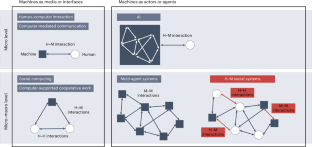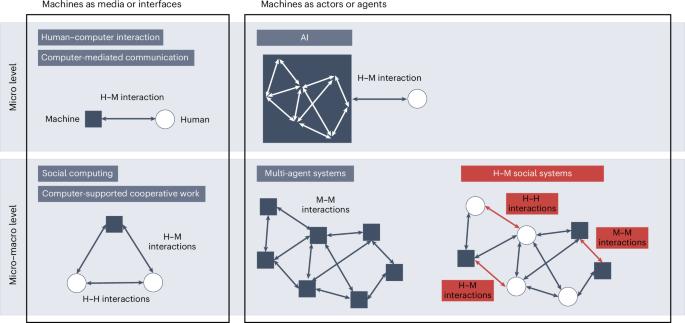A new sociology of humans and machines
IF 21.4
1区 心理学
Q1 MULTIDISCIPLINARY SCIENCES
引用次数: 0
Abstract
From fake social media accounts and generative artificial intelligence chatbots to trading algorithms and self-driving vehicles, robots, bots and algorithms are proliferating and permeating our communication channels, social interactions, economic transactions and transportation arteries. Networks of multiple interdependent and interacting humans and intelligent machines constitute complex social systems for which the collective outcomes cannot be deduced from either human or machine behaviour alone. Under this paradigm, we review recent research and identify general dynamics and patterns in situations of competition, coordination, cooperation, contagion and collective decision-making, with context-rich examples from high-frequency trading markets, a social media platform, an open collaboration community and a discussion forum. To ensure more robust and resilient human–machine communities, we require a new sociology of humans and machines. Researchers should study these communities using complex system methods; engineers should explicitly design artificial intelligence for human–machine and machine–machine interactions; and regulators should govern the ecological diversity and social co-development of humans and machines. This Perspective calls for a new sociology of humans and machines to study groups and networks comprising multiple interacting humans and algorithms, bots or robots. A deeper understanding of human–machine social systems can contribute new and valued insights for AI research, design and policy.


人类与机器的新社会学
从虚假的社交媒体账户和人工智能聊天机器人,到交易算法和自动驾驶汽车,机器人、机械人和算法层出不穷,渗透到我们的通信渠道、社会交往、经济交易和交通动脉。由多个相互依存、相互作用的人类和智能机器组成的网络构成了复杂的社会系统,其集体结果无法仅从人类或机器的行为中推导出来。在这一范式下,我们回顾了最近的研究,并通过高频交易市场、社交媒体平台、开放式协作社区和讨论论坛等背景丰富的实例,确定了竞争、协调、合作、传染和集体决策情况下的一般动态和模式。为了确保人机社区更加稳健、更具弹性,我们需要一种新的人机社会学。研究人员应使用复杂系统方法研究这些社区;工程师应明确设计人机和机机互动的人工智能;监管机构应管理人类和机器的生态多样性和社会共同发展。
本文章由计算机程序翻译,如有差异,请以英文原文为准。
求助全文
约1分钟内获得全文
求助全文
来源期刊

Nature Human Behaviour
Psychology-Social Psychology
CiteScore
36.80
自引率
1.00%
发文量
227
期刊介绍:
Nature Human Behaviour is a journal that focuses on publishing research of outstanding significance into any aspect of human behavior.The research can cover various areas such as psychological, biological, and social bases of human behavior.It also includes the study of origins, development, and disorders related to human behavior.The primary aim of the journal is to increase the visibility of research in the field and enhance its societal reach and impact.
 求助内容:
求助内容: 应助结果提醒方式:
应助结果提醒方式:


